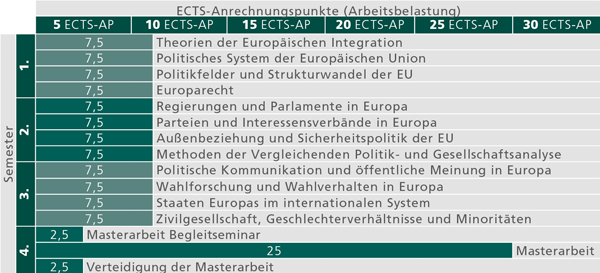Masterstudium Europäische Politik und Gesellschaft
Curriculum (2008W)
Ab dem Wintersemester 2015/2016 darf eine Zulassung zu diesem Studium nur nach dem neuen Curriculum erfolgen. Das nachfolgende Masterstudium finden Sie hier »
Master of Science (MSc)
Dauer/ECTS-AP
4 Semester/120 ECTS-AP
Studienart
Vollzeit
Unterrichtssprache
Deutsch
Voraussetzung
Bachelorabschluss/Äquivalenter Abschluss
Fakultät
Fakultät für Soziale und Politische Wissenschaften
Niveau der Qualifikation
Master (2. Studienzyklus)
Studienkennzahl
C 066 824
* Informationen zum Curriculum (2008W)
- Mitteilungsblatt vom 27.06.2014, 36. Stück , Nr. 543 (Auflassung des Studiums)
- Mitteilungblatt vom 19.02.2008, 20. Stück, Nr. 187
Voraussetzung
Fachlich infrage kommendes Bachelorstudium an der Universität Innsbruck:
Kriterien zur Feststellung der Gleichwertigkeit
Auch bei Abschluss eines anderen fachlich infrage kommenden Bachelorstudiums ist die Zulassung zu diesem Masterstudium möglich. Im Rahmen der Feststellung der Gleichwertigkeit wird jedenfalls die Absolvierung folgender Kernbereiche im Rahmen des abgeschlossenen Bachelorstudiums geprüft:
- 10 ECTS-AP aus dem Kernbereichen Angewandte Methoden der Sozialwissenschaften und Statistik
- 4 ECTS-AP aus dem Kernbereich Europäische Integration
- 5 ECTS-AP aus dem Kernbereich Vergleich Politischer Systeme
- 5 ECTS-AP aus dem Kernbereich Internationale Politik
- 5 ECTS-AP aus dem Kernbereich Politische Theorien
Sollten auf die Herstellung der Gleichwertigkeit nur einzelne Ergänzungen (maximal 30 ECTS-AP) fehlen, kann die Zulassung mit der Auflage von Prüfungen, die im Rahmen des Masterstudiums zu absolvieren sind, verbunden werden.
Informationen zum Studium
- Richtlinien zur elektronischen Einreichung und Veröffentlichung von wissenschaftlichen Arbeiten und Merkblatt
Anerkennungen
- Ansuchen um Anerkennung von Prüfungen UND Beiblatt
ACHTUNG: Füllen Sie bitte das Formular "Ansuchen um Anerkennung von Prüfungen" UND das "Beiblatt Europäische Politik und Gesellschaft" aus!
Empfohlener Studienverlauf
Der unten angeführte, exemplarische Studienverlauf gilt als Empfehlung für Vollzeitstudierende, die das Studium im Wintersemester beginnen. Die Aufstellung dient der Darstellung eines möglichen Studienablaufs und ist nicht verpflichtend. Etwaige Prüfungswiederholungen bzw. deren studienzeitverzögernde Wirkung sind nicht berücksichtigt.
Die Regelstudienzeit beträgt 4 Semester bzw. 120 ECTS-AP, wobei gemäß Universitätsgesetz die Arbeitsbelastung eines Studienjahres 1.500 (Echt-)Stunden zu betragen hat und dieser Arbeitsbelastung 60 Anrechnungspunkte zugeteilt werden (ein ECTS-Anrechnungspunkt entspricht einer Arbeitsbelastung der Studierenden von 25 Stunden).
7,5 ECTS-AP: Theorien der Europäischen Integration
7,5 ECTS-AP: Politisches System der EU
7,5 ECTS-AP: Politikfelder und Strukturwandel der EU
7,5 ECTS-AP: Europarecht
7,5 ECTS-AP: Regierungen und Parlamente in Europa
7,5 ECTS-AP: Parteien und Interessensverbände in Europa
7,5 ECTS-AP: Außenbeziehung und Sicherheitspolitik der EU
7,5 ECTS-AP: Methoden der Vergleichenden Politik- und Gesellschaftsanalyse
7,5 ECTS-AP: Politische Kommunikation und öffentliche Meinung in Europa
7,5 ECTS-AP: Wahlforschung und Wahlverhalten in Europa
7,5 ECTS-AP: Staaten Europas im internationalen System
7,5 ECTS-AP: Zivilgesellschaft, Geschlechterverhältnisse und Minoritäten
2,5 ECTS-AP: Masterarbeit Begleitseminar
25,0 ECTS-AP: Masterarbeit
2,5 ECTS-AP: Verteidigung der Masterarbeit

Formulare
- Prüfungsprotokoll
- Anmeldung der Masterarbeit UND Beilage
- Eidesstattliche Erklärung (der Masterarbeit beifügen)
- Sperre der Masterarbeit
Kontakt und Information
Prüfungsreferat
Standort Universitätsstraße 15

Studienbeauftragter
Dr. David Willumsen
Studiendekan
assoz. Prof. Mag. Dr. Franz Eder
